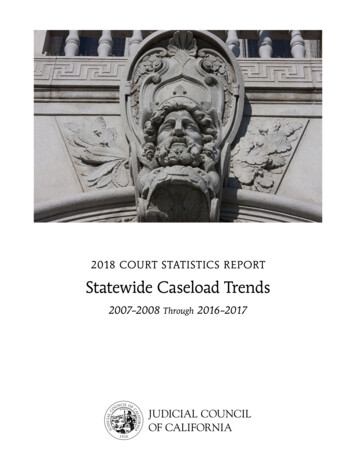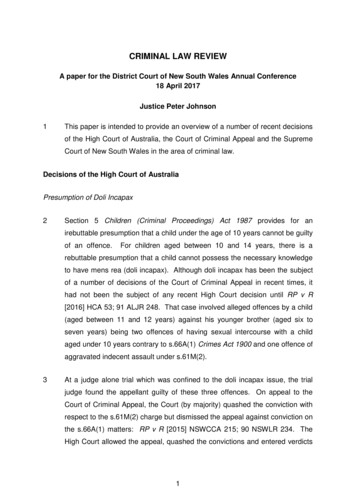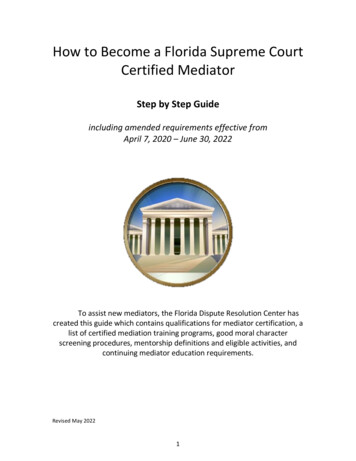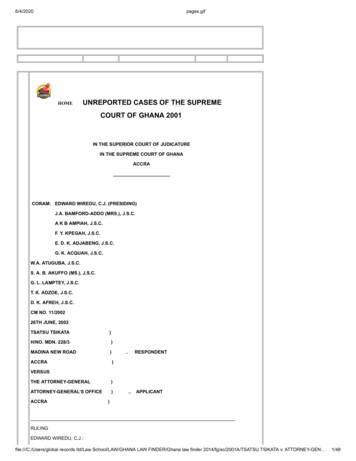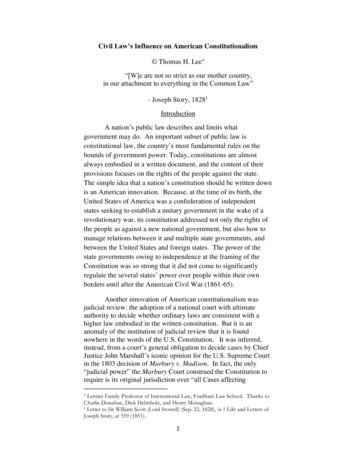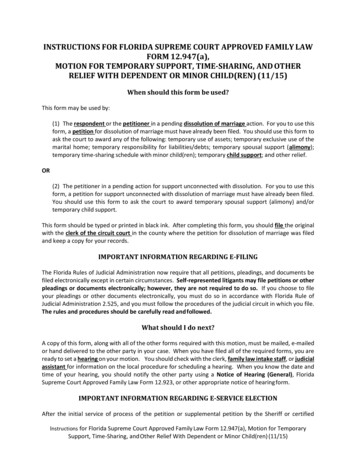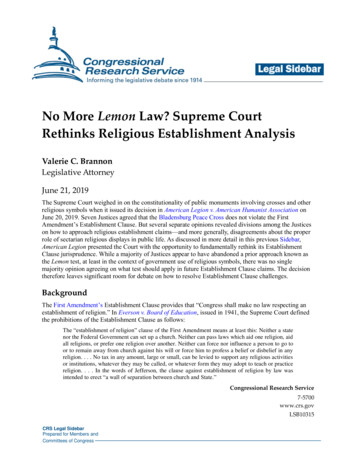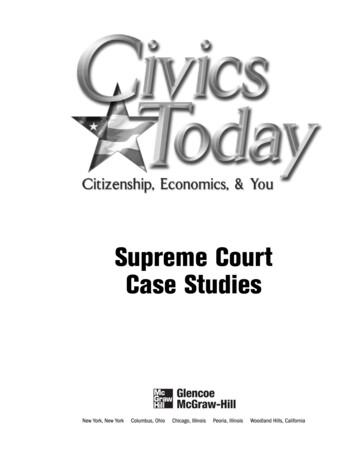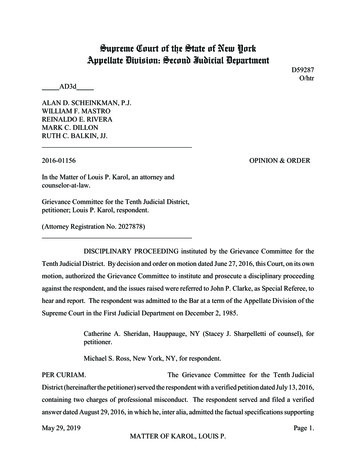
Transcription
Supreme Court of the State of New YorkAppellate Division: Second Judicial DepartmentD59287O/htrAD3dALAN D. SCHEINKMAN, P.J.WILLIAM F. MASTROREINALDO E. RIVERAMARK C. DILLONRUTH C. BALKIN, JJ.2016-01156OPINION & ORDERIn the Matter of Louis P. Karol, an attorney andcounselor-at-law.Grievance Committee for the Tenth Judicial District,petitioner; Louis P. Karol, respondent.(Attorney Registration No. 2027878)DISCIPLINARY PROCEEDING instituted by the Grievance Committee for theTenth Judicial District. By decision and order on motion dated June 27, 2016, this Court, on its ownmotion, authorized the Grievance Committee to institute and prosecute a disciplinary proceedingagainst the respondent, and the issues raised were referred to John P. Clarke, as Special Referee, tohear and report. The respondent was admitted to the Bar at a term of the Appellate Division of theSupreme Court in the First Judicial Department on December 2, 1985.Catherine A. Sheridan, Hauppauge, NY (Stacey J. Sharpelletti of counsel), forpetitioner.Michael S. Ross, New York, NY, for respondent.PER CURIAM.The Grievance Committee for the Tenth JudicialDistrict (hereinafter the petitioner) served the respondent with a verified petition dated July 13, 2016,containing two charges of professional misconduct. The respondent served and filed a verifiedanswer dated August 29, 2016, in which he, inter alia, admitted the factual specifications supportingMay 29, 2019Page 1.MATTER OF KAROL, LOUIS P.
the charges. Related disciplinary proceedings were commenced against each of the respondent’spartners (see Matter of Sosnik, AD3d [decided herewith] and Matter of Hausman,AD3d [decided herewith]). By agreement of the respondent and his partners, a jointdisciplinary hearing was conducted on May 18, 2018. In separate reports dated July 6, 2018, theSpecial Referee sustained all charges against the respondent and his partners. The petitioner nowmoves to confirm the Special Referee’s report, which sustained the charges, and to impose suchdiscipline as this Court deems just and proper. The respondent’s counsel has submitted anaffirmation in support of the petitioner’s motion to confirm, together with a memorandum of law,and urges the Court to grant the motion, sustain the charges, and impose a public censure.The PetitionCharge one alleges that the respondent misappropriated client funds, in violation ofrule 1.15(a) of the Rules of Professional Conduct (22 NYCRR 1200.0), as follows:1. In or about 1994, the respondent and his fellow shareholders and partners, MichaelJ. Hausman and Howard L. Sosnik, formed the law firm Karol, Hausman & Sosnik, P.C. (hereinafterthe Firm).2. At all relevant times herein, the respondent and his partners maintained and weresignatories on an attorney escrow account at JPMorgan Chase Bank incident to the Firm’s lawpractice, entitled “KAROL HAUSMAN & SOSNIK, P.C. Attorney Escrow Account” and bearingaccount number xxxx0565 (hereinafter the escrow account).3. At all relevant times herein, the Firm employed Soncerie Cornegy as its officemanager.4. The respondent and his partners delegated to Cornegy, among other things,responsibility for maintaining the bank and bookkeeping records for the escrow account.5. The respondent failed to properly review, audit and reconcile the escrow account,and he did not properly supervise Cornegy’s activities with respect to the escrow account.6. On or about May 2, 2013, the Firm was notified that check number 6643, issuedfrom the escrow account to 845 Grand Street Associates, LLC, a client of the Firm, for 93,202.04,was presented for payment against the escrow account and dishonored due to insufficient funds.7. By letter dated May 7, 2013, Sosnik, on behalf of the Firm, reported thedishonored check to the petitioner.May 29, 2019Page 2.MATTER OF KAROL, LOUIS P.
8. With the May 7, 2013 letter, Sosnik provided documentation establishing that thedishonored check was caused by an inadvertent over-disbursement at a real estate closing for whichthe Firm was representing 845 Grand Street Associates, LLC, as the seller.9. The respondent and his partners were each notified by the petitioner that suasponte investigations had been opened against them and they were requested to submit bank andbookkeeping records for the escrow account.10. The respondent and his partners advised the petitioner that at or about the timethe Firm self-reported the dishonored check on May 7, 2013, it was discovered that Cornegy hadengaged in unauthorized financial transactions involving, among other things, the Firm’s bankaccounts, including the escrow account.11. On or about May 8, 2013, the respondent and/or his partners identifiedoutstanding escrow checks and determined that, as of that date, the balance in the escrow accountwas deficient by at least 80,000.12. On or about May 8, 2013, the respondent and his partners deposited 100,000in personal funds into the escrow account to cover the identified outstanding escrow checks.13. The Firm retained the accounting firm Hoberman, Goldstein & Lesser, CPAs,P.C. (hereinafter the Accounting Firm), to reconcile and reconstruct the escrow account.14. The respondent and his partners were advised that the Accounting Firm’sreconstruction of the escrow account dating back to 2008 revealed that the account was still deficientby 102,530.43, even after taking into account the referenced 100,000 deposited by the partners.15. On or about November 26, 2013, the Firm deposited 102,530.43 into the escrowaccount to offset the remaining deficiency.Charge two alleges that the respondent failed to adequately supervise the work of anonlawyer employee of the Firm, in violation of Rules of Professional Conduct (22 NYCRR 1200.0)rule 5.3(a), and is responsible for that nonlawyer employee’s conduct, under Rules of ProfessionalConduct (22 NYCRR 1200.0) rule 5.3(b)(2)(ii), as follows:16. The factual specifications of Charge One, paragraphs 1 through 15, are repeatedand re-alleged, as if more fully set forth herein.17. The respondent failed to exercise the reasonable management or supervisoryauthority over Cornegy by which the respondent should have known of Cornegy’s conduct withMay 29, 2019Page 3.MATTER OF KAROL, LOUIS P.
respect to the escrow account, at a time when the consequences of that conduct could have beenavoided or mitigated.The Hearing EvidenceAt a joint hearing on May 18, 2018, the respondent was the first witness to testify,and detailed, inter alia, the Firm’s bank and bookkeeping practices, as well as the events followingthe discovery of the escrow account shortage. The respondent’s partners also testified, and adoptedthe respondent’s testimony as to those circumstances.The respondent and his partners are all experienced practitioners and have abackground in accounting. The Firm’s escrow account was used predominantly to hold client and/orthird-party funds related to real estate transactions, which were ancillary to the estate planning andestate administration work the Firm performed for clients. According to the respondent, the Firmgenerated approximately 4 to 5 million per year in revenue.For approximately 10 years, and until May 2013, the Firm entrusted the bank andbookkeeping responsibilities for the Firm’s bank accounts, including the escrow account, to anonlawyer employee, Cornegy. The respondent described Cornegy as a dedicated and trustedemployee. While the respondent and his partners would “spot-check” transactions on occasion, theydid so to ensure the disbursements equaled the corresponding deposit. The respondent and hispartners admitted that they failed to properly review, audit, and reconcile the escrow account, andthat they did not supervise Cornegy’s activities with respect to the escrow account.On May 1, 2013, Cornegy notified the Firm that she was leaving her position. Thefollowing day, the Firm was notified by Chase Bank that an escrow account check issued to a clienthad been dishonored due to insufficient funds. Sosnik immediately undertook an investigation, anddetermined that this check represented an over-disbursement from a real estate closing. Therespondent testified that Sosnik informed him of his findings, and he requested Sosnik to send aletter to notify the petitioner of the dishonored check, as the respondent “knew that when a checkgets dishonored it’s gonna lead to questions.” Accordingly, Sosnik sent a letter dated May 7, 2013,to the petitioner providing notice of the dishonored check, and including documentation supportingthe Firm’s claim that the subject check had been dishonored as a result of an inadvertent overdisbursement.On May 8, 2013, Sosnik was notified by Chase Bank that there were insufficientMay 29, 2019Page 4.MATTER OF KAROL, LOUIS P.
funds to cover another escrow account check in the sum of 5,143.92. During his conversation withthe bank representative, Sosnik learned that the Firm had online access to its accounts, which therespondent and his partners contend was implemented by Cornegy without their knowledge. Theonline access permitted transfers to be made electronically. After immediately transferring 5,145from the Firm’s operating account to the escrow account, Sosnik began a review of all pendingtransactions. He discovered the Firm’s financial documents had been removed from the file cabinetslocated in Cornegy’s office, and that she had taken post-dated checks for her salary. However, theFirm still had the computer records for the escrow account. Sosnik’s review determined that theescrow account balance was deficient by at least 80,000, based upon the outstanding escrowaccount checks and pending transactions. On May 8, 2013, the Firm wired 100,000 into the escrowaccount.After retaining legal counsel, the Firm retained an accounting firm to reconcile andreconstruct the escrow account for a five-year period. The respondent testified that the Firm alsoreviewed their bank accounts online, and discovered that Cornegy had been transferring moneybetween the Firm’s escrow, operating, and payroll accounts, seemingly without “rhyme or reason,”for a period of at least 3½ years.The Accounting Firm’s review determined that the escrow account balance remaineddeficient, notwithstanding the prior deposits made by the Firm in May 2013 ( 5,145 and 100,000).On or about November 26, 2013, the Firm corrected the account deficiency by depositing anadditional 102,530.43 into the escrow account. The respondent testified that, while reconciling theescrow account, the Accounting Firm had “a high level of confidence” that certain credit cardcharges, totaling approximately 42,500, could be tied to specific defalcations or improper spendingby Cornegy.The respondent testified that he and his partners had “a long discussion” aboutreporting Cornegy to law enforcement and wanted to do so, but they decided that “they could not letthis get out in the public.” The respondent explained that as “fiduciaries, we pride ourselves inprotecting our clients. We were victims, but we didn’t want it to get out there that we were foolishbecause that would hurt us.”In June 2014, Michael J. Hausman left the Firm, and started his own firm. Therespondent and Sosnik continued to practice together, and have instituted changes in theirMay 29, 2019Page 5.MATTER OF KAROL, LOUIS P.
management of the escrow account, including, inter alia, a review of all checks that are being issued,using online access to observe every transaction, and having a monthly reconciliation reportprepared, which is reviewed by the respondent and Sosnik.Findings and ConclusionIn view of the respondent’s admissions and the evidence adduced at the hearing, wefind that the Special Referee properly sustained all charges. Accordingly, the petitioner’s motionto confirm the report of the Special Referee, in which the respondent joins, is granted.In determining an appropriate measure of discipline to impose, we note that whether,and to what extent, attorneys are subject to discipline for defalcations occasioned by someone undertheir supervision depends on a number of factors, as follows:“(1) the subject attorney’s partnership status and/or level of experience; (2) thepresence (or absence) of ‘early warning signs’ of financial improprieties, whethersuch signs were ignored and, if so, for how long; (3) whether the proper authoritieswere notified of defalcations upon their discovery; (4) the presence (or absence) ofmonetary loss to clients and the magnitude thereof; and (5) whether the attorneyattempted to reimburse client losses caused by another” (Matter of Galasso, 105AD3d 103, 105).Here, at the time of the underlying events, the respondent and his partners wereexperienced practitioners, all of whom had a background in accounting. For approximately 10 years,they delegated the bank and bookkeeping responsibilities for the Firm to a nonlawyer employee,Cornegy. The respondent and his partners admitted that, for an extended period, they failed toproperly supervise Cornegy and failed to provide proper oversight of the Firm’s escrow account,resulting in the misappropriation of client funds in excess of 202,000. While the respondent andhis partners claim there were no early warning signs of the financial improprieties occurring in theescrow account, the record reveals otherwise. Indeed, the respondent testified that once they wentonline and looked at their accounts, they saw that, over a 3½ year period, Cornegy was transferringclient funds between the Firm’s escrow, operating, and payroll accounts. Although the respondentand his partners were unaware that online access had been instituted for the Firm’s bank accounts,these questionable transfers were also listed on the monthly bank statements received by the Firm.It is also noted that online transfers were clearly designated as such on the bank statements. We findthat had the Firm’s partners provided proper oversight, including a review of the Firm’s escrowaccount bank statements, the questionable transfers between the Firm’s escrow, operating, andMay 29, 2019Page 6.MATTER OF KAROL, LOUIS P.
payroll accounts, including those transfers which were made using online access, should have servedas an early warning to the respondent and his partners to undertake greater scrutiny of the escrowaccount transactions. The failure to detect these early warning signs is directly attributable to therespondent’s and his partners’ failure to provide proper oversight of the escrow account.In mitigation, we have considered, among other things, the respondent’s and hispartner’s acceptance of responsibility and candor; the absence of venal intent; the Firm’sreplenishment of the misappropriated client funds so that no client sustained a continued financialloss; the Firm’s cooperation with the petitioner’s investigation; the remedial actions taken to instituteproper bank and bookkeeping practices to avoid a reoccurrence; the expressed remorse; the characterevidence; and the respondent’s unblemished disciplinary record in more than 33 years of practice.Under the totality of the circumstances, we find that the respondent’s conductwarrants his suspension from the practice of law for a period of six months.SCHEINKMAN, P.J., MASTRO, RIVERA, DILLON and BALKIN, JJ., concur.ORDERED that the petitioner’s motion to confirm the Special Referee’s report isgranted; and it is further,ORDERED that the respondent, Louis P. Karol, is suspended from the practice of lawfor a period of six months, commencing June 28, 2019, and continuing until further order of thisCourt. The respondent shall not apply for reinstatement earlier than November 27, 2019. In suchapplication (see 22 NYCRR 691.11, 1240.16), the respondent shall furnish satisfactory proof thatduring the period of suspension he: (1) refrained from practicing or attempting to practice law, (2)fully complied with this opinion and order and with the terms and provisions of the written rulesgoverning the conduct of disbarred or suspended attorneys (see 22 NYCRR 1240.15), (3) compliedwith the applicable continuing legal education requirements of 22 NYCRR 691.11(a), and (4)otherwise properly conducted himself; and it is further,ORDERED that the respondent, Louis P. Karol, shall promptly comply with the rulesgoverning the conduct of disbarred or suspended attorneys (see 22 NYCRR 1240.15); and it isfurther,ORDERED that pursuant to Judiciary Law § 90, during the period of suspension anduntil further order of this Court, the respondent, Louis P. Karol, shall desist and refrain from (1)practicing law in any form, either as principal or agent, clerk, or employee of another, (2) appearingas an attorney or counselor-at-law before any court, Judge, Justice, board, commission, or otherpublic authority, (3) giving to another an opinion as to the law or its application or any advice inrelation thereto, and (4) holding himself out in any way as an attorney and counselor-at-law; and itis further,May 29, 2019Page 7.MATTER OF KAROL, LOUIS P.
ORDERED that if the respondent, Louis P. Karol, has been issued a secure pass bythe Office of Court Administration, it shall be returned forthwith to the issuing agency, and therespondent shall certify to the same in his affidavit of compliance pursuant to 22 NYCRR1240.15(f).ENTER:Aprilanne AgostinoClerk of the CourtMay 29, 2019Page 8.MATTER OF KAROL, LOUIS P.
reconstruction of the escrow account dating back to 2008 revealed that the account was still deficient . On May 8, 2013, the Firm wired 100,000 into the escrow account. After retaining legal counsel, the Firm retained an accounting firm to reconcile and reconstruct the escrow account for a five-year period. The respondent testified that the .


